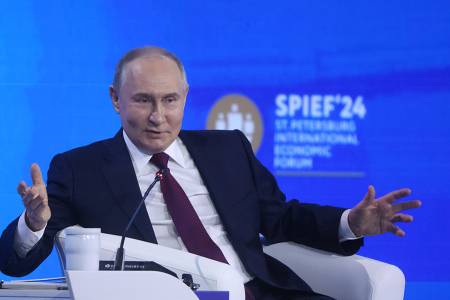"I want to tell you that your fact sheet on the [Missile Technology Control Regime] is very well done and useful for me when I have to speak on MTCR issues."
Russian Nuclear Posture May Change, Putin Says
July/August 2024
By Garrett Welch
Russian President Vladimir Putin said he will not rule out lowering the threshold for using nuclear weapons in Russia’s nuclear posture.

During a June 7 discussion at the St. Petersburg International Economic Forum, Putin was urged by Sergey Karaganov, head of the Council for Foreign and Defense Policy think tank, “to escalate much more forcefully and be prepared to use” nuclear weapons to achieve victory in Ukraine. In response, Putin said that nuclear weapons would only be used in “exceptional cases…when there is a threat to the sovereignty and territorial integrity of the country,” reaffirming Russia’s official declaratory policy issued in 2020. But he refused to “rule out the possibility of making changes to this doctrine.”
Speaking to journalists June 20 during a state visit to Vietnam, Putin said that possible changes to Russia’s nuclear doctrine would be driven by concerns about adversaries’ development of “explosive nuclear devices of extremely low power,” Reuters reported.
Since the beginning of Russia’s full-scale invasion of Ukraine, Putin has made several direct and indirect threats referencing Russia’s nuclear weapons in the context of military setbacks and in protest of NATO support for Ukraine. (See ACT, June 2024; October 2022.)
Russia maintains a stockpile of 1,000 to 2,000 nonstrategic nuclear weapons, according to the Federation of American Scientists. The Trump administration’s 2018 Nuclear Posture Review asserted that Russia had adopted a strategy of “escalate to deescalate” as part of its nuclear posture. This hypothesized strategy would involve the use of low-yield nuclear weapons early in a conventional conflict with the goal of shocking the adversary and deterring further aggression. Although the Biden administration’s 2022 Nuclear Posture Review did not repeat this assertion, it raised concerns about the possibility that Russia would use nonstrategic nuclear weapons to “try to win a war on its periphery or avoid defeat if it was in danger of losing a conventional war.”
The Financial Times reported in February that it had obtained training documents on nuclear operations originating from the Russian Navy, describing a low threshold for nuclear use. The documents date from 2008 to 2014 and are incompatible with Russia’s declared nuclear doctrine as reaffirmed by Putin this month.
In his comments in St. Petersburg, Putin also refused to rule out the resumption of nuclear testing, stating that “if necessary, we will conduct such tests.” He added that there is currently no need for testing because Russia’s “information and computing capabilities allow us to conduct this entire process in its present-day form.” Russia revoked its ratification of the Comprehensive Test Ban Treaty on Nov. 2. The Kremlin justified the move as mirroring the U.S. failure to ratify the treaty.
